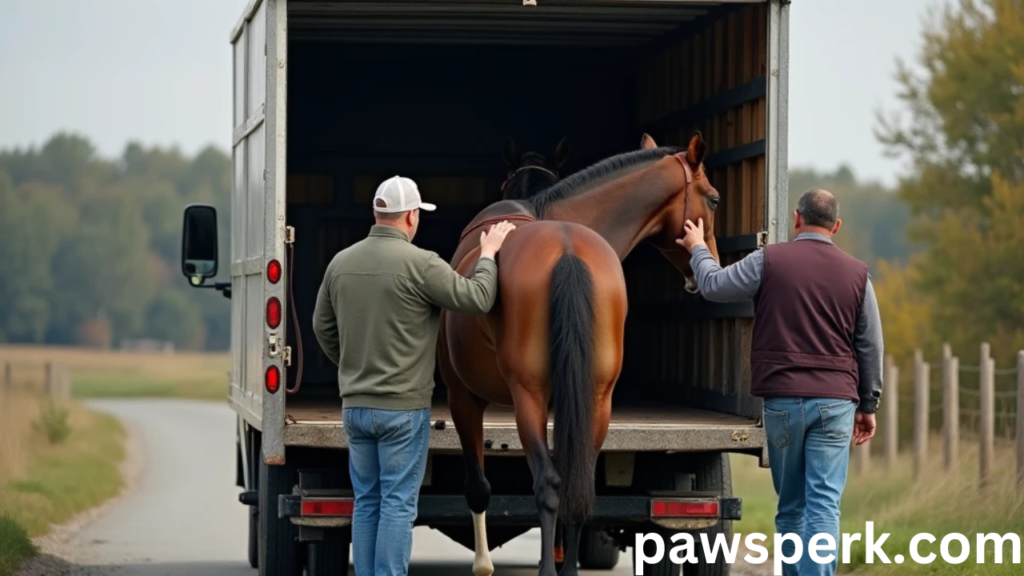A vital component of horse ownership is the safe and comfortable transportation of horses, whether for competitions, veterinary examinations, or relocation. Horse trailers are specialized vehicles made to make this process easier, but they need to be used carefully to protect the handler’s and the horse’s safety and well-being. This blog post will go over important horse trailer maintenance procedures, loading techniques, and safety advice.
The Value of Safety Inspections
Before embarking on any journey with your horse, it is crucial to conduct a thorough safety inspection of your horse trailer to ensure both your horse’s safety and the reliability of the trailer. Proper trailer maintenance can prevent potential hazards and ensure a safe and comfortable trip. Below is a detailed checklist of the key elements to inspect for optimal trailer performance:
- Tires: Verify that every tire is in good shape and correctly inflated. Regularly check for wear and tear on tires because they can cause major accidents.
- Brakes: Test the brakes to ensure they are functioning correctly. This includes checking the breakaway brake battery if applicable.
- Lights: Make sure all lights are on, including turn signals and brake lights. When towing a trailer, visibility is crucial.
- Hitch: Confirm that the hitch is secure and properly attached to your towing vehicle. A loose hitch can lead to dangerous situations on the road.
Loading Your Horse Safely
Performing a thorough safety inspection of your horse trailer is a crucial step before embarking on any journey with your horse. Ensuring that your trailer is in top condition not only guarantees the safety of your horse but also provides peace of mind throughout your travel. A well-maintained trailer can help prevent accidents, minimize stress, and ensure a smooth ride for your horse. Here is a detailed list of essential elements to inspect before setting off:
- Prepare the Trailer: Ensure the trailer is clean and free of any debris that could cause injury. The floor should be matted with appropriate bedding to provide traction and absorb waste.
- Use Proper Equipment: Always use a breakaway halter or a leather halter when tying your horse in the trailer. Non-breakable halters can pose significant risks if an accident occurs.
- Loading Technique: Use a gentle slope ramp if possible, as this minimizes the risk of slipping. Encourage your horse to enter calmly, using treats or gentle pressure as needed.
- Secure Your Horse: Once loaded, tie your horse securely but allow enough slack for comfort. Ensure that all doors and escape routes are closed before tying your horse.
You may also like: 8 Curly-Haired Cat Breeds: You should love
Driving with a Horse Trailer
Different skills are needed when driving a trailer than when driving a car normally. The following advice will help to guarantee a safe trip:
- Adjust Your Speed: Maintain a lower speed than usual to allow for longer stopping distances. Keep in mind that trailers might wobble, particularly when there is wind.
- Defensive Driving: Drive defensively and constantly pay attention to your surroundings. Allow extra space between you and other vehicles, especially when making turns or stopping.
- Frequent Stops: Plan regular stops during long trips to check on your horse’s comfort and hydration. Offer water at these stops to prevent dehydration or colic.

Maintaining Your Trailer
Regular maintenance of your horse trailer is essential for safety and longevity.
- Inspect Regularly: Check for loose bolts or screws inside the trailer that could injure your horse. Ensure that dividers are secure and free from sharp edges.
- Floor Condition: Inspect the floorboards for signs of rot or weakness; replace them if necessary to prevent accidents during loading or unloading.
- Ventilation: Make sure your trailer has adequate ventilation to prevent overheating during transport. Horses can quickly become stressed in poorly ventilated spaces.
Emergency Preparedness
Being prepared for crises might be crucial in unexpected situations.
A properly stocked first aid bag should always be available for both humans and horses. Add supplies like bandages, antiseptics, and veterinary emergency contact information.
- Emergency Equipment: Equip your trailer with flares, cones, and other emergency signaling devices in case of roadside breakdowns.
- Extra Supplies: Keep extra halters, lead ropes, and water on hand to assist in emergencies or if you need to unload your horse quickly.
Conclusion
It takes effort, planning, and knowledge of safety and comfort best practices to transport horses. Performing thorough pre-trip inspections, ensuring that safe loading procedures are followed, driving cautiously when towing a trailer, maintaining your equipment in good working order, and being prepared for any eventuality are all ways that you can help make every trip with your horse safe and stress-free. Whether you are traveling with your horse for a competition or simply for a routine veterinarian examination, taking these steps can not only keep your horse safe but also provide you with peace of mind. Remember that proper trailering not only benefits you as the owner but also has a significant effect on your horse’s overall health.


